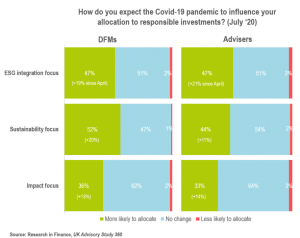17/08/2020
Over the past few months, we at RiF have speculated in several blogposts on the knotty relationship between the effects of the global pandemic and responsible investing.
Ultimately, our expectation that the former would accelerate demand for the latter has become a reality: Calastone’s Fund Flow Index shows inflows into ‘ESG funds’ totalled £1.2bn in Q2, with ESG equity funds bucking the general trend of equity fund outflows in July. £1.2bn may not look like stellar growth in the context of the vast UK fund market, but it represents greater inflows into ESG funds than all previous five years combined. It’s a shift that demands our attention.
Calastone doesn’t distinguish between retail and institutional money. We know that pension schemes and insurers are a few steps (more like a regulation-driven leap) ahead of retail investors and intermediaries on ESG, so it would be logical to assume they account for the increase in inflows. Yet our latest research has found that over two fifths of intermediaries are more likely to allocate to responsible investments due to Covid-19. Around half of DFMs are regarding sustainability-focused funds more favourably now. And this is not just a case of appetite for responsible investing appearing stronger than it did in those halcyon pre-pandemic days – appetite has increased markedly since April, when we first asked intermediaries about the impact of the pandemic.

The cynics among us would argue that the boon in responsible investment assets will be short lived. There is an obvious short-term investment case for reducing allocations to oil and gas giants and airlines, which are prominent players in market indices but often snubbed by sustainable fund managers. BP, for example, recently announced it is halving its dividend after posting a multi-billion-dollar quarterly loss.
But isn’t a focus on ESG factors and sustainability supposed to be about the long-term view, part of a wider analytical picture to determine which companies are worth backing for five years rather than five months? Does the activity we’re seeing now represent a bubble, ripe for bursting once the global crisis eases? At the start of the year, a number of fund managers were warning of such a bubble, arguing that a desire to invest in ESG themes had in some cases impaired judgement about company fundamentals and overinflated share prices.
There are plenty of counterarguments that pop the ESG bubble theory. One of the most compelling of these is that people simply won’t accept ‘business as usual’ during or post-pandemic. They see businesses as having a duty to behave more responsibly going forward, particularly those that have benefited from government – ultimately taxpayer – support in the form of reliefs and bailouts. How companies look after their employees and remunerate senior executives will increasingly be scrutinised, as well as their societal impact.
This is not just a hypothesis of ours; it is supported by many discussions we’ve had in recent months with influential pension scheme managers and CIOs, high-net-worth individuals and even senior managers at insurers.
“The social cost of Covid-19 is very apparent and I think it is important that you engage with companies to encourage them to treat their workforces fairly, to ensure that executives as well as the workforce share the pain of salary cuts, of cost cuts and so on and so forth” – Pension Fund CEO
“Organisations need to be mirrors of society itself rather than pedestal organisations that people look up to just because they are big with a good brand” – Insurer
Coming back to the BP example, the share price has climbed considerably since the company announced the dividend cut. Why? At least partly because the big boss has promised to slash production of oil and gas, set an end date for fossil fuel exploration, and vowed to spend much more on low-carbon energy. Investors have recognised this commitment to change and they clearly value it. Irrespective of how cynical one may be about talk versus action, this is not ‘business as usual’.
Research in Finance’s UK Responsible Investing Study (UKRIS) is a comprehensive research programme that explores understanding of and appetite for responsible investing, as well as unearthing specific support and communication needs and preferences. UKRIS also gives subscribers insight into the market’s perception of their specific approach to ESG and responsible investing, plus the opportunity to test RI-related marketing collateral and messaging with the target audience. To find out more about the study, please contact Annalise Toberman or Richard Ley . The second annual wave of UKRIS kicks off in October 2020.